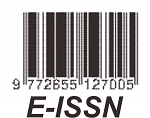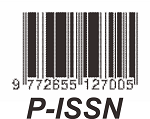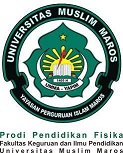ANALISIS HUBUNGAN KEMAMPUAN BERPIKIR KRITIS DENGAN HASIL BELAJAR MAHASISWA PENDIDIKAN FISIKA PADA MATERI BANDUL MATEMATIS
DOI:
https://doi.org/10.46918/karst.v6i1.1805Keywords:
Mathematical Pendulum, Critical Thinking, CorrelationAbstract
Abstract: Analysis of the Relationship between Critical Thinking Ability and Learning Outcomes of Physics Education Students on Mathematical Pendulum Material. This study aims to determine the relationship between critical thinking skills and learning outcomes of physics education students on mathematical pendulum material. In this mathematical pendulum material, critical thinking skills are needed by each student because they need to understand the concept of simple harmonic vibrations and the various components in it. This research method is conducted quantitatively correlative, which describes and investigates the relationship between variables. The correlation coefficient number in the results above shows 0.521 or a positive value, so the relationship between variables is unidirectional. This can be interpreted that the higher the critical thinking skills of students, the higher the student learning outcomes. Based on the correlation coefficient number on the research results, the level of relationship between critical thinking skills and physics learning outcomes on mathematical pendulum material is a moderate correlation. The results and discussion of the research indicate that the critical thinking skills of students have a good tendency.
keywords: Mathematical Pendulum, Critical Thinking, Correlation
Abstrak: Analisis Hubungan Kemampuan Berpikir Kritis Dengan Hasil Belajar Mahasiswa Pendidikan Fisika Pada Materi Bandul Matematis. Penelitian ini bertujuan mengetahui hubungan kemampuan berpikir kritis dengan hasil belajar mahasiswa pendidikan fisika pada materi bandul matematis. Pada materi bandul matematis ini diperlukan keterampilan berpikir kritis setiap mahasiswa karena perlu memahami konsep dari getaran harmonik sederhana dan berbagai komponen di dalamnya. Metode penelitian ini dilakukan secara kuantitatif korelatif, yang dimana menggambarkan dan menyelidiki hubungan antar variabel. Pada hasil di atas angka koefisien korelasi menunjukkan 0,521 dapat diartikan bernilai positif, maka dari itu hubungan antar variabel mempunyai sifat searah. Hal tersebut diartikan bahwa semakin tinggi kemampuan berpikir kritis mahasiswa maka akan semakin tinggi juga hasil belajar mahasiswa. Menurut angka koefisien korelasi pada hasil penelitian, maka tingkat hubungan antara kemampuan berpikir kritis dengan hasil belajar fisika pada materi bandul matematis adalah korelasi sedang. Hasil dan diskusi penelitian mengidentifikasi bahwa kemampuan berpikir kritis mahasiswa memiliki kencenderungan baik.
References
Daruwati, I. 2020. Analisis Korelasi Kemampuan Berpikir Kritis dan Hasil Belajar Mahasiswa pada Mata Kuliah Fisika Dasar. Jurnal Edu Research, 9(2): 2962-3073, doi : 10.30606/jer.v9i2.703.
Firdaus, A. A., Nashiroh, P. K., & Djuniadi. 2020. Hubungan Nilai Matematika dengan Prestasi Belajar Pemrograman Berorientasi Objek pada Siswa Kelas XII Jurusan RPL SMK Ibu Kartini Semarang. Jurnal Nasional Pendidikan Teknik Informatika: JANAPATI, 9(1): 2548-4265. Doi :10.23887/janapati.v9i1.22680.
Hart, C., Da Costa, C., D’Souza, D., Kimpton, A., & Ljbusic, J. 2021. Exploring higher education students’ critical thinking skills through content analysis. Thinking Skills and Creativity, 41(March),100877.doi:10.1016/j.tsc.202 1.100877.
Husnah, M. 2017. Hubungan Tingkat Berpikir Kritis Terhadap Hasil Belajar Fisika Siswa dengan Menerapkan Model Pembelajaran PROBLEM BASED LEARNING . Journal of Physics and Science Learning PASCAL, 1(2): 2614 0950. https://jurnal.uisu.ac.id/index.php/PASC AL/article/view/338.
Laeli,S. dan Okimustava. 2023. Alternatif Praktikum Penentuan Percepatan Gravitasi Menggunakan Aplikasi Phyphox di Masa Pasca Pandemi. Buletin Edukasi Indonesia (BEI), (2): 2962-1674. doi : 10.56741/bei.v2i02.277.
Nurelem. 2022. Hubungan Motivasi Berprestasi dan Kebiasaan Belajar dengan Hasil Belajar Fisika Siswa. Jurnal Ilmiah IKIP Mataram, 9(2): 2355-6358. https://ojs.ikipmataram.ac.id/index.php/jiim.
Purwanti, K. Y., dan Suryani, E. 2018. Pengaruh Discovery Learning Dengan Pendekatan Scientific Berbantuan Powtoon terhadap Motivasi dan Kemampuan Berfikir Kritis. JANACITTA, 1(1): 2615-6598. doi : 10.35473/jnctt.v1i1.17.
Puspitaningtyas, A. R. 2022. Pengaruh Kemampuan Berpikir Kritis Terhadap Hasil Belajar Siswa Pada Mata Pelajaran Matematika Kelas IV di SDN 3 Agel Kecamatan Jangkar Situbondo Tahun Pelajaran 2021/2022. JPM: Jurnal Purnama Media, (1): 2962-3078. https://journal.purnamamedia.org/index. php/jpm/article/view/14.
Putri, H dan Sahyar. 2019. Analisis Pengaruh Proses Pembelajaran dan Berpikir Kritis Terhadap Hasil Belajar Fisika Siswa di Kelas X Madrasah Aliyah. Jurnal Inpafi, 7(3): 2549 8258.
Roflin, E dan F. E. Zulvia. 2021. Kupas Tuntas Analisis Korelasi. Pekalongan: PT. Nasya Expanding Management.
Sari, T. P., Dawud., & Andajani, K. 2019. Hubungan Kemampuan Berpikir Kritis dengan Kemampuan Menulis Teks Editorial Siswa Kelas XII. Jurnal Pendidikan: Teori, Penelitian, dan Pengembangan, 4(1): 2502 471X.
Silberman, D., Carpenter, R., Takemoto, J. K., & Coyne, L. 2021. The impact of team- based learning on the critical thinking skills of pharmacy students. Currents in Pharmacy Teaching & Learning,13(2): 116–121.doi:10.1016/j.cptl.2020.09.008.
Tulung, L. T., Manalu, C. R., Purba, E. N., & Situmeang, N. (2023). Meta Analisis Pengaruh Penerapan Model Pembelajaran Problem Based Learning Terhadap Kemampuan Berpikir Kritis dan Pemecahan Masalah. Jurnal Inovasi Pembelajaran Fisika (INPAFI), 11(1): 2549-8258.
Wahyudin, F. Rismaningsih, U. Hernaeny, E. F. Anggraeni, F. Astuti, B. G. M. Saka, E. Hendrayani, Y. Oktavia, I. P. T. Indrayana, D. O. Nusantari, Sudirman, N. Aziza, J. Setiawan dan Supriyanto. 2022. Pengantar Statistika 2. Bandung: Penerbit Media Sains Indonesia.
Yanti, C. A., & Akhri, I. J. 2022. Perbedaan Uji Korelasi Pearson, Spearman Dan Kendall Tau Dalam Menganalisis Kejadian Diare. Jurnal Endurance, 6(1): 2477-6521. doi : 10.22216/jen.v6i1.137.
Youllanda, W., Medriati, R., & Swistoro, E. 2020. Hubungan Antara Kemampuan BerpikirKritis dengan Hasil Belajar Melalui Model Inkuiri Terbimbing. Jurnal Kumparan Fisika, 3(3): 2655-1403. doi : 10.33369/jkf.3.3.191-198.
Downloads
Published
Issue
Section
License
Karst : Jurnal Pendidikan Fisika dan Terapannya, adalah Jurnal Akses Terbuka (Open Access Journal). Penulis yang menerbitkan artikelnya dalam jurnal ini setuju dengan ketentuan berikut:

This work is licensed under a Creative Commons Attribution-ShareAlike 4.0 International License.
You are free to:
- Share — copy and redistribute the material in any medium or format
- Adapt — remix, transform, and build upon the material for any purpose, even commercially.
- Attribution — You must give appropriate credit, provide a link to the license, and indicate if changes were made. You may do so in any reasonable manner, but not in any way that suggests the licensor endorses you or your use.
- ShareAlike — If you remix, transform, or build upon the material, you must distribute your contributions under the same license as the original.
- No additional restrictions — You may not apply legal terms or technological measures that legally restrict others from doing anything the license permits.








94.jpg)

















